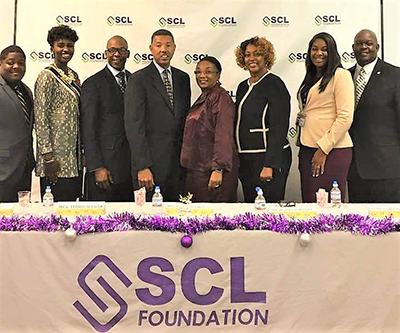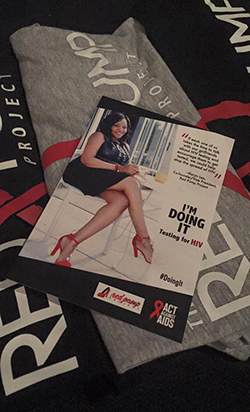Partner Spotlight
We are excited to continue showcasing the efforts of our Partnering and Communicating Together to Act Against AIDS (PACT) members who are working to extend the reach of our campaign materials, resources and engagement efforts into the community. As we recap efforts from National Black HIV/AIDS Awareness Day (NBHAAD) and prepare for National Women and Girls HIV/AIDS Awareness Day (NWGHAAD), we are pleased to spotlight the work of the Southern Christian Leadership Foundation.
The Southern Christian Leadership Foundation, Inc. (SCLF), established by Harry Belafonte and Sidney Poitier, has been providing services to the community for over 48 years. Today, the organization remains committed to principles that encourage individual responsibility for taking active care of family, neighborhood, community and the nation. A substantial part of that work involves bringing awareness about HIV to individuals across the nation. We sat down with Mrs. Bernice L. Frazier, the current President and CEO of the organization, to talk about some of SCLFs efforts to influence the course of HIV prevention in African American communities.
Q. There are many competing issues affecting the lives of African Americans and SCLF works to address many of those? How does SCLF go about keeping HIV and AIDS at the forefront?
 A. Our primary approach is through our Silence is Sinful (SIS) HIV/AIDS Initiative which SCL Foundation launched in 2008. SIS is the organization’s signature health program, through which members work with community- and faith-based organizations to increase public awareness of HIV and AIDS, dispel related myths and to heighten awareness of HIV status.
A. Our primary approach is through our Silence is Sinful (SIS) HIV/AIDS Initiative which SCL Foundation launched in 2008. SIS is the organization’s signature health program, through which members work with community- and faith-based organizations to increase public awareness of HIV and AIDS, dispel related myths and to heighten awareness of HIV status.
We use a philosophy called “Quantum Responsibility,” which ensures that individuals are educated, inspired and empowered to use their influence and their personal power to improve their communities. This approach, when applied to HIV, ensures that once someone learns about the impact of the virus they hold themselves accountable for taking the necessary personal steps that will in-turn improve in their community, society and world.
Q. Churches, especially those with predominantly African Americans congregations, are often described as being hesitant to discuss sex and sexuality. Has SCLF experienced similar barriers when engaging churches around HIV education and prevention?
A. Yes, we were confronted with resistance when we began this journey and it took persistence and dedication to the cause to move past those barriers. As part of the SIS initiative, we continuously strive to strengthen our network of champions, especially within the Black Church, who can support us in implementing innovative, credible, and effective HIV prevention efforts that respond to the unique challenges facing African Americans.
SIS Champions serve not only as a liaison between SCLF and the congregation, but also as a bridge between their church and other local affiliates, and partners, such as health departments, civic/social organizations, and others that have experience in HIV/AIDS education, testing, and treatment.
Through these relationships we have been able to find success in hosting educational activities that increase HIV/AIDS awareness, testing, and linkages to care within the church.
Q. What advice would you give to those who are experiencing difficulties in engaging and mobilizing local church partners in the fight against HIV?
A. I would advise them to take it one step at a time. First involve the leaders of the church and have them identify an individual to work with them. Then assure them that the goal is not to change their beliefs and/or doctrine, but to save lives.
SCLF’s goals are simple: dispel as many myths and misinformation as possible, influence more individuals to be tested, reduce discrimination against those who are infected, increase public knowledge and support for prevention programs for those who are most at risk. We have found that once the leaders have a clear understanding of those goals, and recognize that we are not in the business of challenging their doctrine, they become more open to working together.
Q. You have talked before about your personal commitment to improving the lives of women and girls. What activities does SCL Foundation have planned in support of National Women and Girls HIV/AIDS Awareness Day (NWGHAAD) to help women and girls increase their knowledge of HIV and take action?
A. Sista Phi Sista is one of our signature programs designed to assist women and girls on several levels. The program supports teen mothers with tutoring and through mentoring and we use those opportunities to also sprinkle in information about sexual health and of course HIV prevention.
Having said that, we will be hosting free HIV testing on March 10th and that evening, from 6pm to 8pm, our “Impactful Voices” Series will host a Women’s Forum on Issues affecting Women Today, which will be broadcasted via Facebook Live.
 In addition to our PACT members, Act Against AIDS is also fortunate to have many other community and national partner organizations. One such partner organization, The Red Pump Project®, has been instrumental in raising awareness about the impact of HIV and AIDS on women and girls. Founded in 2009, Red Pump empowers, educates, and motivates women to drive bold conversations around HIV prevention and issues related to sexual and reproductive health. Cupcakes and Condoms, the organization’s signature program, is an educational town hall that connects women and girls with the information they need over complimentary desserts.
In addition to our PACT members, Act Against AIDS is also fortunate to have many other community and national partner organizations. One such partner organization, The Red Pump Project®, has been instrumental in raising awareness about the impact of HIV and AIDS on women and girls. Founded in 2009, Red Pump empowers, educates, and motivates women to drive bold conversations around HIV prevention and issues related to sexual and reproductive health. Cupcakes and Condoms, the organization’s signature program, is an educational town hall that connects women and girls with the information they need over complimentary desserts.
Last year, in an effort to expand the impact of the event, the organization conducted a ten-city tour to bring HIV information to communities heavily affected by HIV. In partnership with the Doing It campaign, Red Pump distributed materials about the importance of HIV testing for women of color and in select cities, offered confidential HIV testing.
- Page last reviewed: March 16, 2017
- Page last updated: March 16, 2017
- Content source:


 ShareCompartir
ShareCompartir